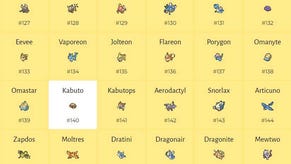Inside PokémonMaxRaids, the kindest community on the internet
How free shinies, elaborate exploits, and pay-it-forward culture created an online haven.
A little while ago, I suddenly found myself caring about Max Raid Battles in Pokémon Sword and Shield. Pokémon has a knack for this: you play, you finish the story and the afters, and for a while that's it. But then a long weekend appears. A bit of time in lieu needs using up. You catch yourself thinking, actually, why not? Why not finish the Pokédex? Why not get into competitive training? I'll do it - and this time I'll mean it. And down the rabbit hole you go.
The problem is, raids are important for doing those things in Sword and Shield - and raiding is not enormously fun. For one, much the same as the raids of Pokémon Go, when it comes to actually finding a proper group and coordinating a session, most of the work is left to communities outside of the game itself, the slack picked up by fans on Twitter, or reddit, or Discord. More than that, however, raids are painfully time-consuming - when you're in the raid itself, but more so when you're actually trying to find something specific. (As I found out the hard way, amateurishly working through the 'dex).
In other words then, raids might be a neat idea, designed in that typically Pokémon way to get fans playing together - but in that other typically Pokémon way, they're no fun without the community's help.
Enter: r/PokemonMaxRaids. At around 11,600 members, MaxRaids is on the smaller side by Pokémon subreddit standards - the main Sword and Shield one has 381,000, for instance - and on the surface it's a fairly quiet place, too. New posts come at a rate of maybe one a day, mostly as brief, curiously jargon-heavy notes about a new raid being hosted, and on the surface, that's about it. It's a strange place. But there are clues, little and not-so-little breadcrumbs - a list of rules here, a 6000 word FAQ here, a Google Doc that leads to another guide-within-a-guide - and following them will lead you to the most incredible reward. The real community: a bustling, deeply inventive Discord server, designed not only to crack those built-in problems to raiding but make even the most impossibly small encounters possible.
But it's also something else: a tolerant, respectful, deeply generous community that's become, by gaming's standards and those of the wider online world, borderline utopic.
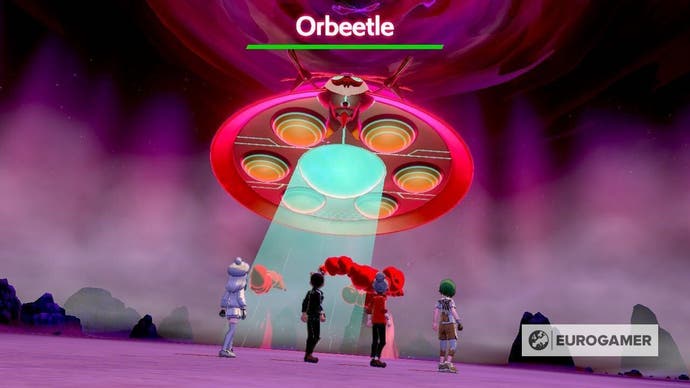
PokemonMaxRaids, or just MaxRaids, began in 2019, with one of the founding moderators, Kirzi, nabbing the subreddit name within minutes of the feature's early June reveal. The expectation, Kirzi tells me via Discord message, alongside a fellow founding mod and good friend, Salti, was that it would remain relatively low-key, like r/FestivalPlaza and r/friendsafari, other subreddits for similarly niche Pokémon features that they'd managed in the past. For a short while it did: the sub was dormant until the games launched later in November, and things didn't take off until a few months later in February 2020.
"We got it set up and let it do its thing," Kirzi explains, but then people wanted a Discord, which the pair were hesitant to try, given their lack of experience with it compared to moderating reddit. They decided to go ahead nonetheless, and it turns out those people were right. Since then it's grown into a thriving, 10,000-member hub.
The server's purpose is to be less of a looking-for-party, raid-organising kind of thing, and more of a completely bespoke system, devised in order to track down extremely rare variations of any available raid Pokémon - and then, crucially, to "host" raids for them, allowing any players in the server the chance to catch it.
These types of Pokémon, I should add, go beyond the standard, quite rare kind that I was originally after before tumbling down the well. Combining things like Gigantamax capability with a smattering of the other, most desirable traits - like having "perfect" stats, a Hidden Ability, or most of all being a shiny - the average Pokémon hosted on MaxRaids are ultra rare. Statistically, you've a better chance of winning the Euromillions than catching some of these naturally.
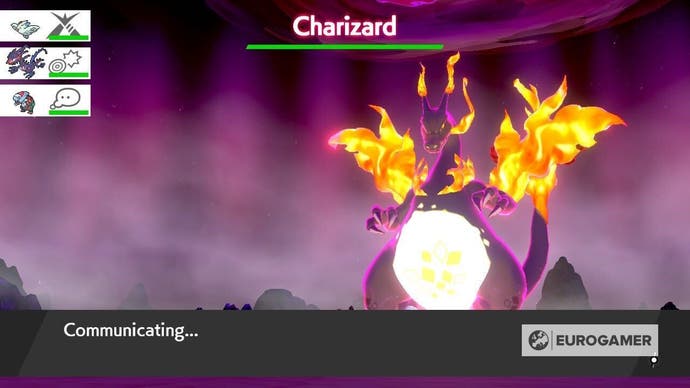
Nevertheless, here they are - and the process of hosting these raids, too, is seriously involved. It's impossible to do it justice with just a quick explanation - the community's own general FAQ and hosting guide are the places to go if you want to know the gritty details. But the elaborateness of it is really the point, as you'll hopefully see, so, I will try. Very broadly speaking, it works like this:
Raids in Sword and Shield take place at 'dens', periodically spawning and refreshing each day, and each of these dens has a set group of Pokémon that can appear there were a raid to spawn. If you spawn a raid in a specific way however - by using a Wishing Piece at a den - then a raid not only appears, but will stay available there indefinitely, until you defeat and attempt to catch that Pokémon. If you leave it active, however, then every 24 hours the Pokémon that appears in that raid changes to another one, from that original group.
Curiously, the stats and characteristics of the Pokémon that appear on each day (but not the Pokémon species itself) is actually fixed, from the moment you lob the Wishing Piece down the den. This could be very useful for tracking down these ultra-rare Pokémon - but! To preserve the illusion of random chance, that set order of the Pokémon's qualities is hidden from the player. The game knows almost everything about the Pokémon that may appear in the raid there today, tomorrow, and every day after, but there's no in-game way for you to check it. Plus, even if you did know, there's of course no natural, in-game way to skip forward in time to reach the Pokémon you want, without simply waiting until for the many dozens, hundreds, or even thousands of days to pass.
After discovering this is the way raid spawns work, the RNG community and PokémonMaxRaids team also created a solution: both a way to see this hidden list of Pokémon attributes that are set to appear there each day (which they call the "Raid seed"), and exploits for skipping forward in time to reach the one you're after (called "frame-skipping" - not dissimilar to the "time travel" exploits some people use to advance days and get ahead in Animal Crossing).
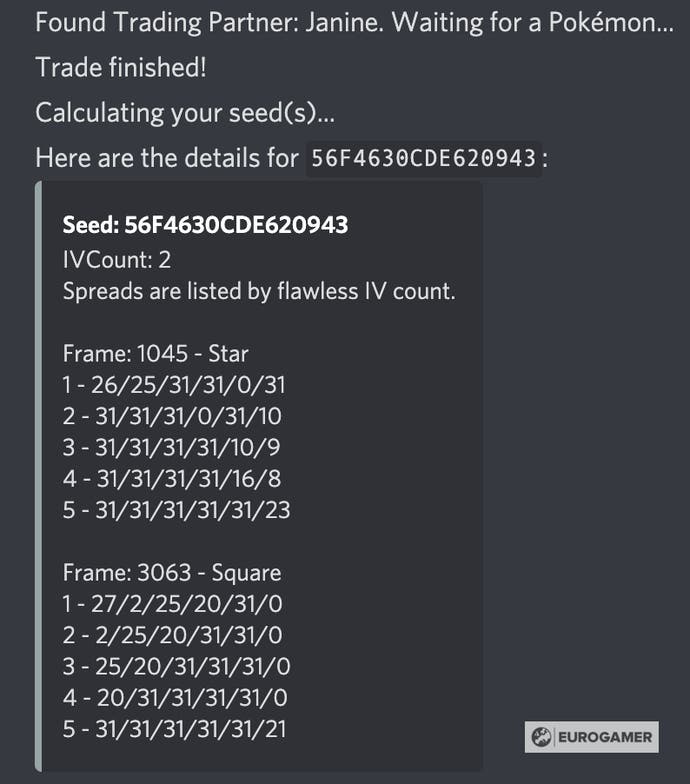
Actually doing this, however, takes considerable time and considerable effort on behalf of the would-be host, and also requires the availability of other, supporting community members to be around to help too. The "seed checking" requires someone to be on call at all times, as it can't be done yourself, and the checkers themselves either need access to either a "CFW'd Switch" (a hacked one, basically - "custom firmware" as the community puts it), or a bot that's based on one, and they may need to check the seed for the host multiple times, depending on what they're after.
All this, and the host still needs to do plenty more themselves: keep refreshing the seed until they get one that doesn't put them too far from the target Pokémon; download something called RaidFinder, which is a custom-built piece of software that spits out the results for how far away you are; and then do the real work, manually grinding through, on average, upwards of 3,000 frames. Combined, all of this will average out to a good few hours of work, which hosts will often split over a couple of days. As Kirzi puts it, somewhat mildly: "even with the fast method of advancing frames, it's really time consuming and tedious" - and luck of the draw can cause that overall time to vary wildly.
Once this intrepid host has done all of that - got a seed, had the seed checked, retried for a good seed, and skipped the many, many frames - they then do the actual hosting, which again takes several more hours. Hosts create a corresponding reddit post, signal the raid on Discord, and then bed in for a while, gradually adding scores of players as friends (which have to be deleted after, due to the Switch's friends list cap), and hosting just three of them at a time, each time initiating the raid battle, ducking out, adding three more people, and going again.
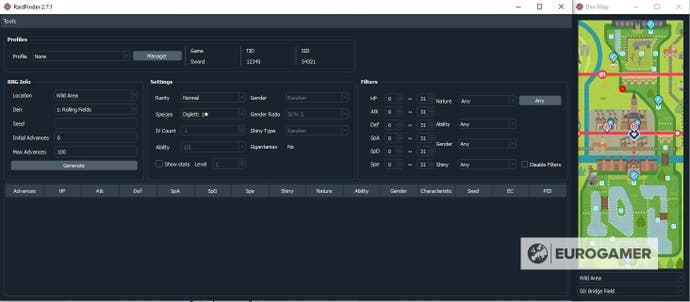
Each raid takes up to ten minutes or so, but crucially each raider only has about a 3 or 4 per cent chance of catching a Gigantamax Pokémon with a regular ball, which means - hosts being the good people they are, and letting everyone keep trying until they get it - doing this quite a few times over. "Two hours is about average," Salti says, for how long someone will tend to stay hosting once they've found the Pokémon and set it all up. But there are ones that go much longer: "we've had them go up to 18 or even 24 hours, at which point I'm personally begging them to eat and sleep and take a break."
And yet, if you're just passing through, all of this labour is invisible: it's possible to just rock up on the server, take advantage of the custom alerts, and bag yourself a whole suite of impossibly rare Pokémon, unhacked and "tournament legal" - ready for official competitions and all. Without overselling it, to your average, would-be hardcore collector, it's a revelation. But more revelatory still: all of this combined work, every step of the way, is done for absolutely nothing at all in return.
"But I just flag, before we move to growth, the critical rule that everything is built on."
We're still talking about the basics of PokemonMaxRaids, when it began and how it got going, when Salti politely interjects to talk about modding philosophies. It is, in a way, an example of the pair's approach in action - and the friendly-yet-firm way in which they go about it. This is the stuff the whole community is built on: principles, philosophies, mutual respect. Everything is about laying foundations, setting tone, agreeing to rules and referring back to them.
That generosity, the hours or days spent finding and hosting raids, is a case in point: the "critical rule" Salti is citing here is the principle of "paying it forward". Not only does nobody ask for anything in return for the lengthy act of hosting a raid - nobody is allowed to.
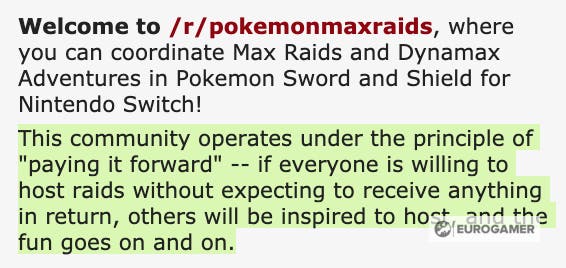
The MaxRaids mods brought this rule over from another community that they'd managed. "It was inspired by r/SVExchange," Kirzi tells me, which they explain is a similar community "built on giving away eggs that can be hatched shiny on others' games, and helping others hatch their own via trading with people who "match".
"It had a really generous and friendly environment and I wanted that. Rather than the trading environment of r/ptrades," which Kirzi also moderated in the past, "where you're in it mainly for personal gain."
This point is places like SVExchange are fundamentally "not just built on pay-it-forward of in-game goods, but pay-it-forward of labor," Salti adds. "Same goes for raid hosting". There were also some early signs that it would be necessary for this community - some people were demanding an ultra-high value fee (often, the raider's Master Ball, the one thing that guarantees a catch) in exchange for allowing players to join their raids. "It was extra annoying because the most popular raids were Gigantamax raids," Kirzi explains, "and those have an extremely low catch rate for non-hosts. So you pay one Master Ball for like a 3 per cent chance at actually getting the Pokémon. It started even before we figured out how to RNG shiny raids, so it was just for normal Gigantamax raids too."
It wasn't always that extreme, the mods explain, but the main point was, as Kirzi put it, to discourage any sort of "exchange-based environment - especially since, even if it's not required, there's always that social pressure. We didn't want users to feel any of that pressure."
From that first principle, the wider community blossomed. "People really bought into pay-it-forward," Kirzi explains. Their alternative to a "system of exchange" was one Salti describes as one of "record-keeping and aesthetics." A reddit flair system for hosts, different colours and "roles" for them on Discord, and a general appreciation for custom emotes, which all amounts to a kind of tacit respect for those who do the most work. Raiders "give back," Salti says, "simply by leaving a record of having joined their raids" with a quick comment on the corresponding reddit post. The more raiders you've hosted, the better role colours and flairs the hosts get. "It also has the benefit of driving traffic from the subreddit to the Discord, so there's a nice symbiotic relationship there."
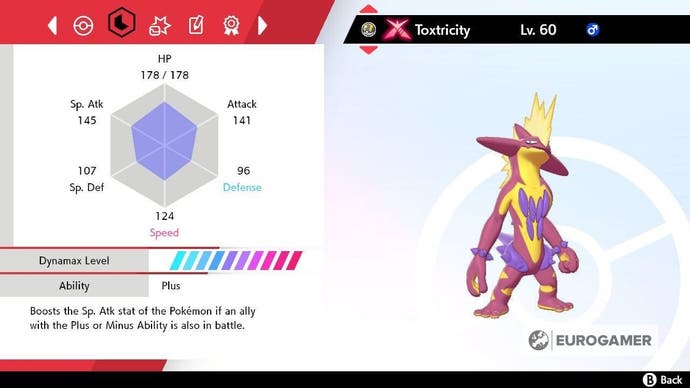
Beyond that, the reddit comments also kept the sub "active", which makes it more discoverable in search engines for curious newcomers to raiding (like yours truly) who then in turn find their way to the Discord. "We had people joining reddit for the Discord, and those joining the Discord would be encouraged to post on reddit," says Kirzi, "and that feedback loop of sorts drove a ton of activity."
It grew a "culture of helpers," Salti explained, and both "really shaped what kind of users we attracted," and also "tended to train new users to buy into the model. People who wandered in with zero experience of the Pokémon community or [the mechanics around] RNG got free shinies generously given, realized there was a whole host of people (pun intended) happy to help them learn to RNG and host, and became hosts themselves.
"I think I ran a really slapdash poll once and of our "max hosts" (the ones who have hosted enough to get 250+ "joined" comments on reddit), only one or two learned to host somewhere else. Almost all of the people who give shinies on PokemonMaxRaids were inspired to do it and learned to do it here." There are now at least a hundred people that have become hosts who regularly dedicate their time.
Fast forward a year from the server's launch, to November 2020, and in the spirit of Thanksgiving Salti, Kirzi, and the other mods have set up a dedicated "#thank-you" channel for anyone to leave a quick note to other members.

The result is extraordinary. Hundreds, possibly thousands of lengthy, heartfelt, often deeply personal messages: thanking others for helping them find a place they felt at home, for helping them overcome struggles with anxiety, or socialising with others, for helping them through the world's various lockdowns and quarantines, for helping them discover themselves. Most are paragraphs long. Some come via attached Google Docs, as they go over the Discord character limit. Some have hundreds of flashing, dancing custom emotes left in reply. Most are addressed to new friends met on the server, new support networks and allies, and many more to the mods themselves.
"I get some of my philosophy from teaching," Salti says. "Workshops on inclusivity in the classroom and all that." Outside of life as a moderator, Salti, real name Janine, is a PhD student and teaching assistant. She also trained at San Diego's National Conflict Resolution Centre, she tells me, and "in another life," did "a lot of work with on-the-ground coexistence dialogue groups in Israel."
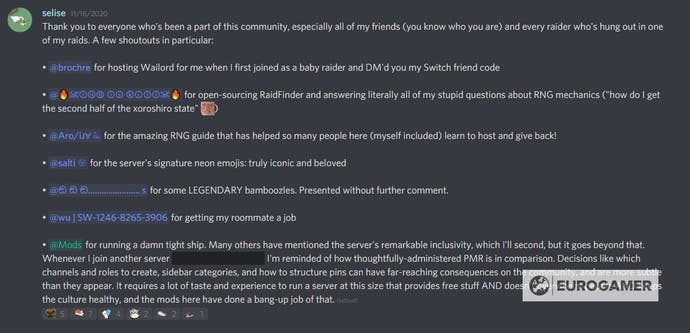
She credits her partner, a long-time moderator of mega-subs like r/aww, r/food, r/askreddit, and the main r/pokemon, for getting her into moderation itself, as well as the rest of the 13-strong, hugely diverse moderation team, and specifically Kirzi for much of the style they now adopt (the pair themselves met on r/pokemontrades, in fact, with Kirzi "interviewing" Salti for the role as a new mod). But her own expertise is clear.
"So, the structural things are critical: baseline rules, channel organization, flair system, et cetera - but I really live for the micro moments, embedded in conversation around the community. Early on, a lot of the work was in simply being part of the conversation, active in the channels, and gently pushing dialogue the way I/we wanted it to go. One half of that is obviously actioning "incidents". Hate speech and slurs, but also incidents of rudeness or dismissiveness, people speaking for others, assuming things about others, making people feel less-than or unwelcome."
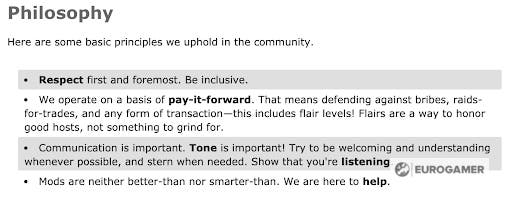
She splits those "incidents" into two varieties, each with their own response: "unknowing harm and knowing harm. In either case, we do start out by asking them to describe what happened, their perspective, their motivation," she says. A moderator would then "reflect that we've heard them, then pivot to how what they said or did impacted others. The distinction between intent and impact is really important, because it centers the action but doesn't necessarily accuse someone of being a bad person."
Much of this is built on a technique they refer to as muted conversations. "Muting means grabbing a user and isolating them in a channel, so they can't see the rest of the server, and we can talk to them to work an issue out." (You can see the teaching influence: talking to a disruptive student outside of the classroom, instead of in front of their peers).
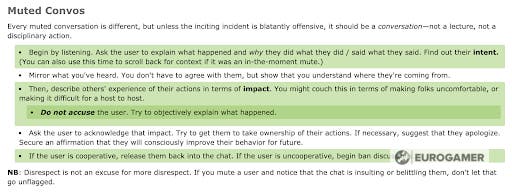
I'm curious as to how people would take it, but "people typically do respond to the fact that we're visibly respecting them by asking them to explain things from their point of view first," she says, "and appreciate that we're not interested in "punishing" but more teaching. There are, of course, people who refuse to acknowledge any harm done and double-down on things like transphobia, at which point it's an easy ban. We also have a filter that automatically mutes people for words we think are especially egregious."
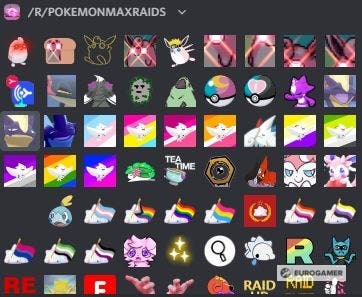
"Sometimes people just want to apologize and be done with it," Kirzi adds. "And we factor that into decisions of whether to direct-message or use the muted channel. And sometimes there are blatant trolls that get banned straightaway without anything else."
"The other half is actively making the space positive and leading by example," Salti continues. "Actively making room for difference and celebrating that in the space - whether that's based on age, national origin, sexuality, gender identity."
An example of that, which Salti describes as a "huge thing, and such an easy thing early on," is a pronoun bot that the team added to the Discord server. On joining, the first thing you're encouraged to do is read the rules channel - standard stuff for well-run community discords - and in there right near the top is a pinned post, that allows you to add pronouns to your profile just by responding to the post with a certain emote.
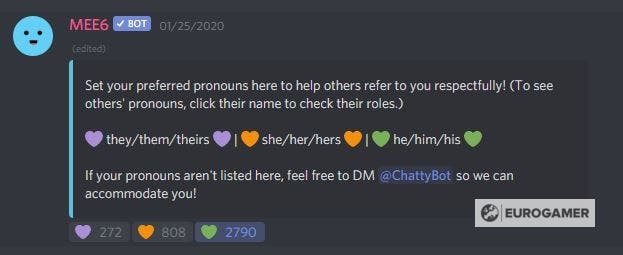
"The fact that it's right there as the first thing you see when you land in the rules channel signals what the community is like," Salti tells me. "That we're going to respect your gender identity and also care about making it visible. But a lot of it is also just existing in the chat and stating "here's how I am different" and "you are welcome," which breeds more of that energy and sense of safety.
"One of our long-time users began using their chosen name for the first time and came out as non-binary for the first time, both on our server-before they came out to their family or school or anything in real life. My point of difference is pretty weak sauce, but it's worth noting that this was the first place I felt comfortable talking about my race, rather than letting people assume I was white."
"I'm Asian-American, half Korean half Chinese. I'm 27 but apparently look younger so I'm constantly dealing with ageism and infantilization in real life, and this is something I talk about a lot with folks on the server, particularly our nonbinary friend who came out with us, and a trans guy living in China.

"There's a LOT of conversations going on that have absolutely zero to do with raiding," Salti continues, and the examples of real, genuine impact it's had on community members are numerous. Kirzi tells one story, of a Sylveon raid someone was hosting with a special trans pride theme. It culminated in what Salti calls a "banner moment for visibility and pride on the server," as users donated to The Trevor Project, a suicide prevention charity for LGBTQ youth. "The host has a trans brother and when he heard about that the next day, he was in tears," Kirzi says. "That whole thing is easily one of my favorite moments to see as a mod."
Now, in the months since, the community's virtuous cycle means it's evolved again, to become "almost self-moderating." The mods are still very much active, of course, and the work continues. But as Salti puts it, the fact that the community takes care of itself gives the moderators the "space" to do the fun stuff - monthly events, themed contests and activities around Valentine's Day, April Fools, Halloween, the simple things that let users make friends and have a bit of fun.
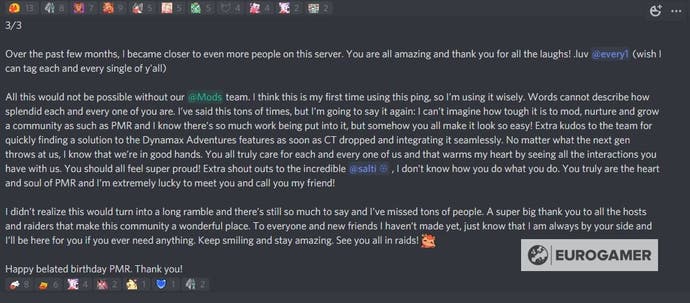
Kirzi and Salti themselves are testament to that. The two send each other gifts, from time to time - Gulpin cards and some special stickers, Salti tells me - and they've also met up, in person, at the Pokémon World Championships in 2019. The only time so far, she notes, "but it definitely won't be the last."
Crucially, their philosophy remains ever-present. Towards the end of our conversation, I'm double-checking the origins of it all - the seed checking, the frames, the custom firmware and how it all got figured out - when the pair tell me much of the credit for that initial discovery, the early, heavily technical work, is down to another redditor, who goes by AdmiralFish.
"The funny thing is," Kirzi says, "Fish doesn't even own Sword or Shield. He does it just because he likes helping communities like ours." Another stranger paying it forward.
Note: We've updated the article with some minor clarifications, in particular that Wishing Pieces fix the stats and attributes of future raids, but not the Pokémon species itself, and to more clearly note the wider RNG community's involvement in some exploit discoveries. Apologies for the error!





